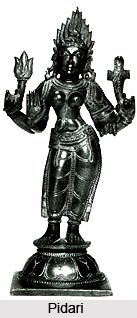 Pidari is said to be a spouse of Lord Shiva and is said to be an incarnation of Kali. The image of this deity is also known as Pitali. This deity is worshipped more in South India than in the northern part of the country.
Pidari is said to be a spouse of Lord Shiva and is said to be an incarnation of Kali. The image of this deity is also known as Pitali. This deity is worshipped more in South India than in the northern part of the country.
The deity Pidari is shown holding a noose trident, skull cup and drum. She is shown entangled by a snake, which is a South Indian characteristic frequently linked with the drum held by Shiva. Pidari is shown having glowing hair, two or three eyes and in some cases the cup may be rectangular. Here breasts are shown decorated with snakes and she is shown seated or having an elephant drive. She has a terrifying appearance with her long incisor teeth. This intended to frighten off evil spirits against which she is called upon.
The deity is occasionally reduced to the position of village deity. But, the existence of the Pidari deity can be traced back to the Chola period (about A.D. 850 to 1279 AD). She was then referred by at least six different names, including a name called Kala Pidari (i.e. Kali). It shows the tendency of propagation of female deities during that period. With the influence of Tantrism, these independent goddesses developed at that time including the Pidari deity. At that time, more emphasis was placed on two aspects of the deities, their fierce appearance and sexual symbolism.



















